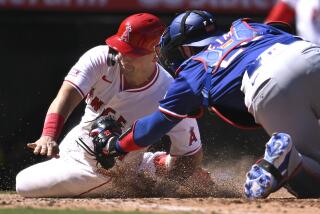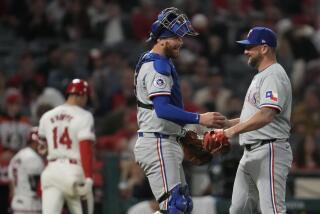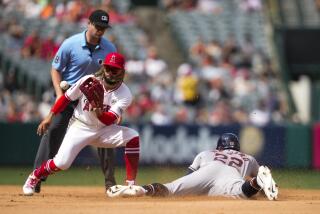Bad Start for Vaughn Has a Happy Ending
Hearts dropped in the Angel dugout Thursday night, much the way they did when Mo Vaughn crashed into the dugout in the 1999 season opener and suffered an ankle sprain that spoiled his season.
This time, the rapid descent was caused by a first-inning Darren Oliver fastball that hit Vaughn in the helmet, producing a sickening thud that could be heard throughout Edison Field and sent him sprawling in the dirt.
But Vaughn got up, and the Angels survived the, well, Vaughn-sized scare, recovering to defeat the Texas Rangers, 6-1, before a crowd of 23,150 to pull to within four games of first-place Seattle in the American League West.
Rookie right-hander Seth Etherton subdued the Rangers for 7 1/3 innings, giving up one run and six hits and striking out two to improve to 5-1, Darin Erstad had two hits and two runs batted in, and Scott Spiezio homered to pace the offense.
Vaughn tied a franchise record with four walks after getting hit by the pitch, but the Angels were simply glad he could walk again. The ball hit Vaughn’s ear flap. An inch or two lower, and it might have hit him in the face.
“That was scary, because that’s a sound you recognize anywhere,” Angel Manager Mike Scioscia said. “You knew it hit his helmet. Thank God it hit him in the ear flap, where he had some protection.”
Scioscia and team trainers rushed to Vaughn’s aid, and a concerned Oliver came to the plate immediately to check on him. Vaughn got to his feet, but he appeared woozy on the basepaths, retreating to first instead of rounding second on Troy Glaus’ ensuing two-out fly ball to left.
As he waited for teammates to bring him his glove after the inning, Vaughn remained hunched over near first base, his hands on his knees, trying to gather himself.
“I’ve been drilled before--I’ve been hit by Randy Johnson--it’s not a big deal,” Vaughn said. “I played nine innings. There’s nothing to it.”
Vaughn, who challenges pitchers to throw inside by the way he hunches over the plate, did not believe there was any purpose to the pitch. “I’ve known Darren for a long time,” Vaughn said. “He didn’t mean to hit me.”
Scioscia was impressed with the way Vaughn bounced back. Ivan Rodriguez opened the second with a grounder to third, and Glaus’ throw was wide, to Vaughn’s left. But Vaughn made the catch and swiped a tag on Rodriguez.
“It just shows you what he’s made of,” Scioscia said. “He didn’t give an inch in his next at-bats. He’s not going to scare off.”
Neither is Etherton. Only two years removed from college, Etherton is showing he can not only win at the big league level--he can dominate.
Etherton retired the first nine Rangers before Luis Alicea led off the fourth with a bloop single to left-center. Rusty Greer reached when his cue shot of a grounder spun off Glaus’ glove for an error.
But Etherton pitched his way out of the jam by getting Rafael Palmeiro to fly to left, Rodriguez to line to second and David Segui to pop to third.
Glaus helped Etherton out of a first-and-second, one-out jam in the fifth by turning Royce Clayton’s chopper into an inning-ending, 5-3 double play. The Rangers finally scored in the sixth on Alicea’s double and Rodriguez’s RBI single to cut the lead to 4-1.
Etherton was pulled after two walks in the eighth, but reliever Shigetoshi Hasegawa got Palmeiro to ground into an inning-ending double play and retired the side in the ninth for his third save.
Etherton’s control was so good that of his 109 pitches, 72 were strikes. With his third consecutive quality start, he lowered his ERA to 3.97.
“Seth keeps making a bigger footprint every time he goes out there,” Scioscia said. “For him to pitch as well as he did and use all his pitches, that’s a great plus for us. He’s for real.”
As usual, Etherton was not overpowering. He has not relied on a dominating fastball. His strikeouts come on off-speed pitches and well-placed fastballs.
“I didn’t see anything that would knock your eyes out as a scout, except he pitched,” Ranger Manager Johnny Oates said. “He didn’t throw, he pitched. He looked like he really knew what he was doing. He kept us off-balance and made his pitches.”
More to Read
Go beyond the scoreboard
Get the latest on L.A.'s teams in the daily Sports Report newsletter.
You may occasionally receive promotional content from the Los Angeles Times.






